一般现在时的讲解以及练习题
完整版)小学一般现在时讲解及练习题
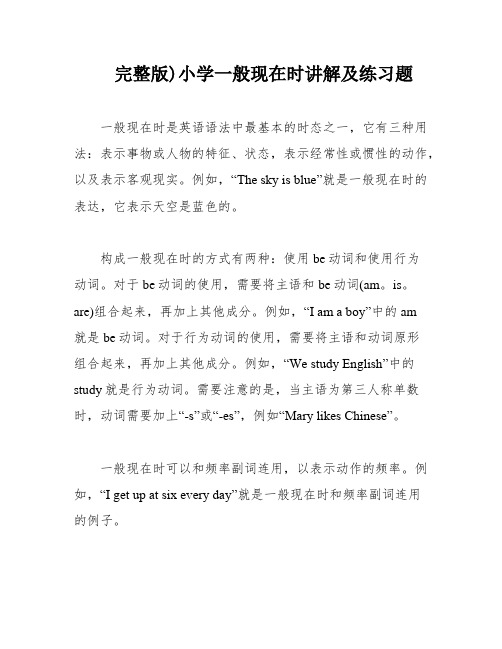
完整版)小学一般现在时讲解及练习题一般现在时是英语语法中最基本的时态之一,它有三种用法:表示事物或人物的特征、状态,表示经常性或惯性的动作,以及表示客观现实。
例如,“The sky is blue”就是一般现在时的表达,它表示天空是蓝色的。
构成一般现在时的方式有两种:使用be动词和使用行为动词。
对于be动词的使用,需要将主语和be动词(am。
is。
are)组合起来,再加上其他成分。
例如,“I am a boy”中的am就是be动词。
对于行为动词的使用,需要将主语和动词原形组合起来,再加上其他成分。
例如,“We study English”中的study就是行为动词。
需要注意的是,当主语为第三人称单数时,动词需要加上“-s”或“-es”,例如“Mary likes Chinese”。
一般现在时可以和频率副词连用,以表示动作的频率。
例如,“I get up at six every day”就是一般现在时和频率副词连用的例子。
一般现在时还可以用于构成否定句、一般疑问句和特殊疑问句。
对于be动词的否定句,需要在be动词后面加上not。
例如,“He is not a worker”就是be动词的否定句。
对于行为动词的否定句,需要在主语和动词原形之间加上don't或doesn't。
例如,“I don't like bread”和“He doesn't often play”就是行为动词的否定句。
对于一般疑问句,需要将be动词或do/does放在主语前面。
例如,“Are you a student?”就是一般疑问句。
对于特殊疑问句,需要在疑问词后面加上一般疑问句。
例如,“Where is my bike?”就是特殊疑问句。
需要注意的是,当主语为第三人称单数时,否定句和一般疑问句需要用doesn't,而不是don't或do。
例如,“He doesn't often play”和“Does she go to work by bike?”就是主语为第三人称单数时的否定句和一般疑问句。
一般现在时知识讲解与专项练习(讲义)-人教PEP版英语六年级上册

六年级上册一般现在时知识讲解与专项练习一、一般现在时知识点【No. 1】概念:1.表不事物或人物的特征、状态。
如:The sky is blue.天空是蓝色的。
2.表示经常性或习惯性的动作。
如:I get up at six every day.我每天六点起床。
3.表示客观现实。
如:The earth goes around the sun.地球绕着太阳转。
【No.2】时间标志性词:every ... (every day/week/Sunday...)on+星期几(on Mondays/Tuesdays..)频度副词(always, usually often sometimes, rarely, seldom, never)【No.3】结构:①动词原形I like apples.②动词单三形式He plays football.③be动词I am a boy.有be无动(动:实义动词)①肯定句:主语+be+其他He is an English teacher.②否定句:主语+be not+其他He is not an English teacher.③一般疑问句:Be +主语+其他+...?Is he an English teacher?有动无be(动:实义动词)①肯定句:主语(非三单)+动词原形+其他I play football.主语(三单)+动词三单形式+其他He plays football.②否定句:主语(非三单)+don’t+动词原形+其他I don't play football.主语(三单)+doesn’t动词原形+其他He doesn't play football.③一般疑问句:Do+主语(非三单)+动词原形+其他?Do you play football?Does+主语(三单)+动词原形+其他?①肯定形式:主语十情态动词can/may+动词原形+宾语。
小学生一般现在时讲解及练习题
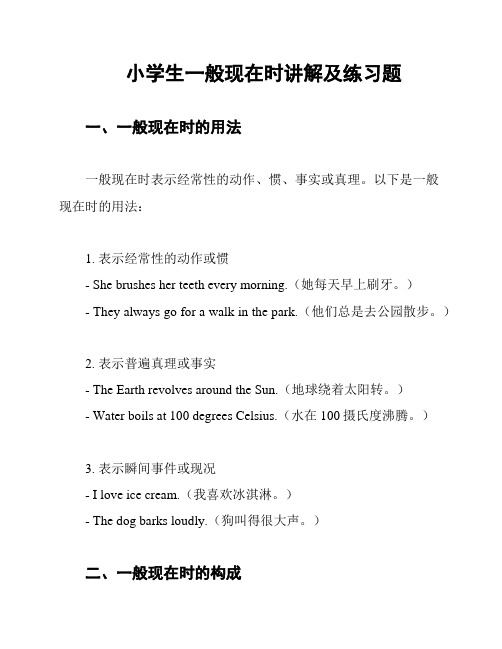
小学生一般现在时讲解及练习题一、一般现在时的用法一般现在时表示经常性的动作、惯、事实或真理。
以下是一般现在时的用法:1. 表示经常性的动作或惯- She brushes her teeth every morning.(她每天早上刷牙。
)- They always go for a walk in the park.(他们总是去公园散步。
)2. 表示普遍真理或事实- The Earth revolves around the Sun.(地球绕着太阳转。
)- Water boils at 100 degrees Celsius.(水在100摄氏度沸腾。
)3. 表示瞬间事件或现况- I love ice cream.(我喜欢冰淇淋。
)- The dog barks loudly.(狗叫得很大声。
)二、一般现在时的构成在一般现在时中,动词的变化相对简单。
1. 对于第三人称单数(He/She/It),动词要加-s或-es。
- He walks to school every day.(他每天走路去学校。
)- She eats an apple.(她吃一个苹果。
)- It runs fast.(它跑得很快。
)2. 对于其他人称(I/You/We/They),动词不变。
- I play soccer on weekends.(我周末踢足球。
)- You read books every night.(你每晚读书。
)- We go swimming in summer.(我们夏天去游泳。
)- They watch movies together.(他们一起看电影。
)三、练题请根据句意填入正确的动词形式。
1. My mother __________ (cook) dinner for us every evening.2. Tom and Lisa __________ (play) tennis on Saturdays.3. The sun __________ (rise) in the east.4. We __________ (study) English at school.5. Dogs __________ (bark) when they see strangers.1. cooks2. play3. rises4. study5. bark希望以上讲解和练习题对你有帮助!。
(完整)一般现在时讲解与练习(初中英语)
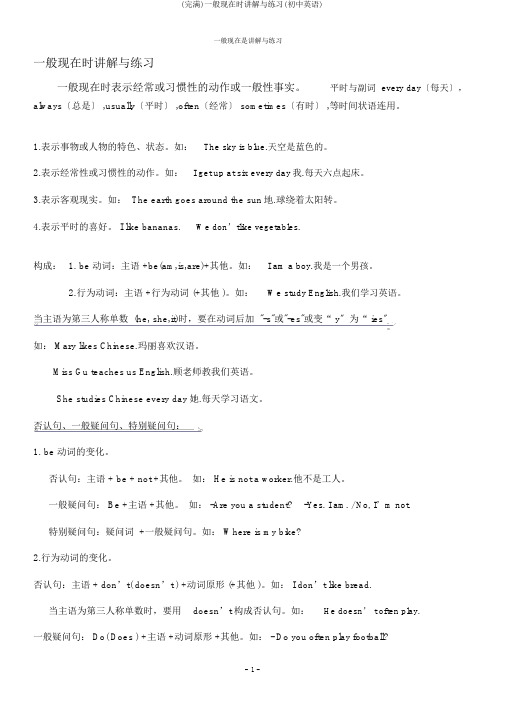
一般现在是讲解与练习一般现在时讲解与练习一般现在时表示经常或习惯性的动作或一般性事实。
平时与副词 every day〔每天〕,always〔总是〕 ,usually〔平时〕 ,often〔经常〕 sometimes〔有时〕 ,等时间状语连用。
1.表示事物或人物的特色、状态。
如:The sky is blue.天空是蓝色的。
2.表示经常性或习惯性的动作。
如:I get up at six every day我.每天六点起床。
3.表示客观现实。
如: The earth goes around the sun地.球绕着太阳转。
4.表示平时的喜好。
I like bananas.We don’tlike vegetables.构成: 1. be 动词:主语 +be(am,is,are)+其他。
如:I am a boy.我是一个男孩。
2.行为动词:主语 +行为动词 (+其他 )。
如:We study English.我们学习英语。
当主语为第三人称单数 (he, she,it)时,要在动词后加 "-s"或"-es"或变“ y〞为“ ies〞如: Mary likes Chinese.玛丽喜欢汉语。
Miss Gu teaches us English.顾老师教我们英语。
She studies Chinese every day她.每天学习语文。
否认句、一般疑问句、特别疑问句:1. be 动词的变化。
否认句:主语 + be + not +其他。
如: He is not a worker.他不是工人。
一般疑问句: Be +主语 +其他。
如: -Are you a student?-Yes. I am. / No, I’m not.特别疑问句:疑问词 +一般疑问句。
如: Where is my bike?2.行为动词的变化。
否认句:主语 + don’t( doesn’t ) +动词原形 (+其他 )。
一般现在时、频度副词讲解与练习

第二单元语法课堂练习一、一般现在时讲解及练习基本用法(1)一般现在时常表示经常发生的动作或经常存在的状态如: I go to school every day.表示此状态时,常和always,often,usually,everyday,sometimes等表示时间的状语连用,有时候时间状语可以不表示出来。
(2)表日常行为:如:The boy wake up at seven a'clock,wash ,dress quickly and run into the dining room for breakfast. They wait until they hear the bell and then go to school.(3)表习惯,能力等:如:Do you drive, Joho?(4)表客观存在:如:Fire burns火会燃烧(表客观事实)The earth moves round the sun.地球围绕太阳旋转(表客观真理) 练习题:1. Tom is a worker. He _____ in a factory. His sisters _____ in a hospital.A. work/ workB. works/ workC. work/ works2. Who _____ English best in your class?A. speakB. speaksC. speaking3. Mrs Read _____ the windows every day.A. is cleaningB. cleanC. cleans4. We _____ music and often _____ to music.A. like/ listenB. likes/ listensC. like/ are listening5. She _____ up at six in the morning. A. get B. gets C. getting6. On Sunday he sometimes _____ his clothes and sometimes _____ some shopping.A. wash/ doB. is washing/ is doingC. washes/ does7. The twins(双胞胎) usually _____ milk and bread for breakfast, but Jim _____ some coffee for it.A. have/ haveB. have/ hasC. has/ have8.Jenny ____ in an office. Her parents ____in a hospital.A work worksB works workC work are workingD is working work9. One of the boys_____ a black hat.A haveB there isC there areD has10. We will go shopping if it____ tomorrow.A don't rain Bdidn't rain Cdoesn't rain Disn't rain11. He said the sun ____in the east and ____in the west.A rose; setB rises; setsC rises, setD rise; sets12. Wang Mei ____ music and often ____ to music.A like; listenB likes; listensC like; are listeningD liking ; listen13. Jenny____ English every evening.A has studyB studiesC studyD studied14. She _____ up at six in the morning.A. getB. getsC. getting15.The students will go to the Summer Palace if it _____ tomorrow. A.don't rain B. doesn't rain C. won't rain16. The picture _______ nice.A.looksB.is lookedC.lookD.is looking17. Don't smoke until the plane ______ off.A.takesB.tookC.was takenD.is take18. John is always ______ others.A. helpB. helpingC. helpsD. to help19. You'd better ______ at home and ______ your homework.A. to stay, doB. stay, doC. to stay, to doD. stay, to do20. Uncle Wang knows _______ a washing machine.A. how to makeB. to makeC. how makingD. what to make21. My father always __________(come) back from work very late.22. The teacher is busy. He __________ (sleep) six hours a day.23. Listen! Joan __________(sing) in the classroom. She often __________ (sing) there.24. __________ your brother __________(know) Japanese?25. Where __________ you __________ (have) lunch every day?26. The girl __________(like) wearing a skirt. Look! She __________(wear) a red skirt today.二、频度副词、短语用法及练习一般现在时常常与always, usually, often, sometimes, seldom, hardly, never等频度副词连用,表示动作发生的频率。
【英语】英语一般现在时解题技巧讲解及练习题(含答案)含解析
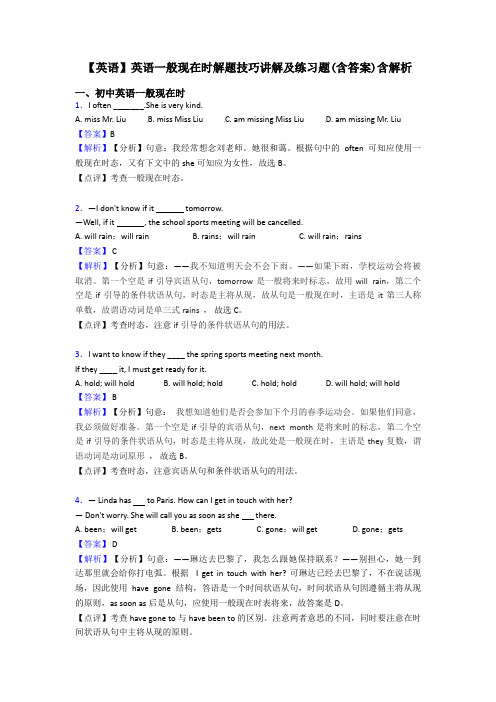
【英语】英语一般现在时解题技巧讲解及练习题(含答案)含解析一、初中英语一般现在时1.I often _______.She is very kind.A. miss Mr. LiuB. miss Miss LiuC. am missing Miss LiuD. am missing Mr. Liu【答案】B【解析】【分析】句意:我经常想念刘老师。
她很和蔼。
根据句中的often可知应使用一般现在时态,又有下文中的she可知应为女性,故选B。
【点评】考查一般现在时态。
2.—I don't know if it tomorrow.—Well, if it , the school sports meeting will be cancelled.A. will rain;will rainB. rains;will rainC. will rain;rains【答案】 C【解析】【分析】句意:——我不知道明天会不会下雨。
——如果下雨,学校运动会将被取消。
第一个空是if引导宾语从句,tomorrow是一般将来时标志,故用will rain,第二个空是if引导的条件状语从句,时态是主将从现,故从句是一般现在时,主语是it第三人称单数,故谓语动词是单三式rains,故选C。
【点评】考查时态,注意if引导的条件状语从句的用法。
3.I want to know if they ____ the spring sports meeting next month.If they ____ it, I must get ready for it.A. hold; will holdB. will hold; holdC. hold; holdD. will hold; will hold【答案】 B【解析】【分析】句意:我想知道他们是否会参加下个月的春季运动会。
如果他们同意,我必须做好准备。
第一个空是if引导的宾语从句,next month是将来时的标志,第二个空是if引导的条件状语从句,时态是主将从现,故此处是一般现在时,主语是they复数,谓语动词是动词原形,故选B。
一般现在时讲解与练习

一般现在时Present Tense一、概念:表示通常性、规律性、习惯性的状态或者动作(有时间规律发生的事件)的一种时间状态。
拆开来讲就是:时间:指动作发生在“现在”的时间段内。
那么,多长的时间才叫“现在”呢?一天?状态:一般现在时最容易迷惑的一个问题,就是拿不准什么叫“经常发生的动作或存在的状态”?这个问题要分三层来讲:1.“经常发生的动作”,比如每天起床、吃饭、上学,一个星期去几次超市或新华书店等。
这些事件中,有的是有规律的,有的是偶尔做几次。
这些都算经常发生的事件。
我们要告诉人们的,是这个动作经常发生,是一般的情况而不是具体的某一次。
2.事物存在的状态。
3.有些动作或状态是永恒的,比如长江向东流、地球绕着太阳转,比如谚语中举的事例、文学作品中描绘的事例,像“好马不吃回头草”等等二、基本用法:1.表示经常性或习惯性发生的动作。
如:I always get up at 7 o’clock in the morning.我总是在早上7点起床。
We often read books at school.我们在学校经常看书。
They usually have dinner at 6:00 in the evening.他们通常在晚上6点吃晚餐。
2.表示现在的状态或特征。
如:She loves English very much.她非常爱英语。
We are always at home on weekends.周末我们总留在家。
Tom is an exellent player.汤姆是一位优秀的运动员。
3.表示客观的现实。
如:The sun rises in the east.太阳从东方升起。
Summer comes after spring.夏天在春天的后面4.用在按计划、规定或安排发生的事情。
如:The plane leaves at 9:30.飞机9点30分起飞。
Tomorrow is Sunday.明天是星期天。
初中英语一般现在时态讲解与习题附答案

一般现在时1概念引入在英语中,不同时间发生的动作和情况,要用不同的动词形式表示,这种不同的动词形式叫做动词的时态。
今天我们要学习的是一般现在时。
2用法讲解一、一般现在时的使用范围。
1. 表示现在的状态。
例如:I’m twelve. 我十二岁。
Where’s the schoolbag? 书包在哪里?2. 表示经常或者习惯性的动作。
例如:I have lunch every day. 我每天吃午饭。
Gina always asks: “Where is my schoolbag?”Gina总是问:“我的书包在哪里啊?”3. 表示客观事实或者存在。
例如: My sister is a teacher. 我姐姐是一位老师。
The earth turns around the sun. 地球绕着太阳转。
4. 表示主语所具备的性格和能力。
例如:She likes English very much. 她很喜欢英语。
Bill likes beef, but he doesn’t like chicken.比尔喜欢牛肉但是不喜欢鸡肉。
以上所述均是一般现在时的基本使用范围,除此之外一般现在时还有其他一些特殊用法,比如:一般现在时可以用在一些从句中表将来等,我们会在以后的学习中讲到。
注意:一般现在时态经常与often(经常),sometimes(有时),always(总是),usually (通常)等副词连用,也经常与every day(每天), every week(每周), every month (每月), every term(每学期), every year(每年), once a week(一周一次),twice a year(一年两次)等时间状语连用。
例如:She gets up early every morning. 她每天早上早起。
I go to see my grandmother every month. 我每个月都去看我的奶奶。
一般现在时练习题与讲解
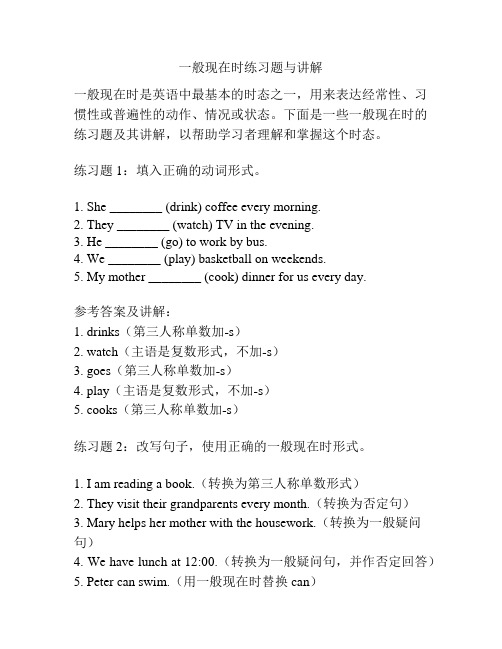
一般现在时练习题与讲解一般现在时是英语中最基本的时态之一,用来表达经常性、习惯性或普遍性的动作、情况或状态。
下面是一些一般现在时的练习题及其讲解,以帮助学习者理解和掌握这个时态。
练习题1:填入正确的动词形式。
1. She ________ (drink) coffee every morning.2. They ________ (watch) TV in the evening.3. He ________ (go) to work by bus.4. We ________ (play) basketball on weekends.5. My mother ________ (cook) dinner for us every day.参考答案及讲解:1. drinks(第三人称单数加-s)2. watch(主语是复数形式,不加-s)3. goes(第三人称单数加-s)4. play(主语是复数形式,不加-s)5. cooks(第三人称单数加-s)练习题2:改写句子,使用正确的一般现在时形式。
1. I am reading a book.(转换为第三人称单数形式)2. They visit their grandparents every month.(转换为否定句)3. Mary helps her mother with the housework.(转换为一般疑问句)4. We have lunch at 12:00.(转换为一般疑问句,并作否定回答)5. Peter can swim.(用一般现在时替换can)参考答案及讲解:1. He is reading a book.(第三人称单数形式,动词加-s)2. They do not visit their grandparents every month.(在visit前面加助动词do的否定形式,do not)3. Does Mary help her mother with the housework?(将助动词do 提前,变为一般疑问句)4. Do we have lunch at 12:00? No, we don't.(用助动词do提问,再用do not做否定回答)5. Peter swims.(一般现在时形式,去掉can)练习题3:根据给定的情景,填入正确的动词形式。
(完整word版)一般现在时专项练习题
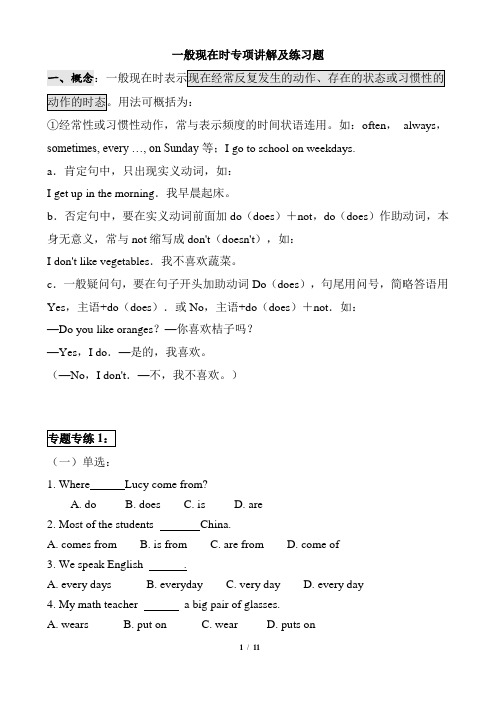
一般现在时专项讲解及练习题一、概念:一般现在时表示现在经常反复发生的动作、存在的状态或习惯性的①经常性或习惯性动作,常与表示频度的时间状语连用。
如:often,always,sometimes, every …, on Sunday等;I go to school on weekdays.a.肯定句中,只出现实义动词,如:I get up in the morning.我早晨起床。
b.否定句中,要在实义动词前面加do(does)+not,do(does)作助动词,本身无意义,常与not缩写成don't(doesn't),如:I don't like vegetables.我不喜欢蔬菜。
c.一般疑问句,要在句子开头加助动词Do(does),句尾用问号,简略答语用Yes,主语+do(does).或No,主语+do(does)+not.如:—Do you like oranges?—你喜欢桔子吗?—Yes,I do.—是的,我喜欢。
(—No,I don't.—不,我不喜欢。
)(一)单选:1. Where Lucy come from?A. doB. doesC. isD. are2. Most of the students China.A. comes fromB. is fromC. are fromD. come of3. We speak English .A. every daysB. everydayC. very dayD. every day4. My math teacher a big pair of glasses.A. wearsB. put onC. wearD. puts on5. What your father and mother ?A. does, doB. do, doC. are, doD. do, does(二)用动词适当形式填空:1. His radio is broken. It (sound)terrible.2. Did somebody drop water on the rug? It (look)wet.3. Every year my parents (give)me a present for my birthday.4. The club (send)her a letter every month.5. your dad (wash)his car once a week? Yes, he does.6. Lin Tao is a good student. He (study)very hard.7. They (work)at the bank.(三)句型转换:1. My living room has three windows. (改为否定句)2. Jim and Jack like swimming on Sundays.(就划线部分提问)3. We are in the same class. (改为一般疑问句)4. He comes from England.(就划线部分提问)一、用所给动词的适当形式填空。
一般现在时讲解及练习(含答案)

一般现在时讲解及练习(含答案)一、单项选择一般现在时1.If he ________ exercise, he______ healthy.A.not; will B.isn’t; won’t beC.doesn’t; will be D.doesn’t do; won’t be【答案】D【解析】【详解】考查if条件句中的时态。
句意:如果他不做运动,他就不会健康。
If条件句,如果主句用一般将来时态,则从句用一般现在时态,且句子主语是he,单数第三人称,故选D。
2.Whene ver you ______ a present, you’d better think about it from the receiver’s preference. A.bought B.buy C.will buy D.have bought【答案】B【解析】试题分析:句意:每当你买礼物的时候,你最好从接收方的偏好想一想。
whenever引导的让步状语从句,采用一般现在时表将来的用法。
故选B。
考点:考查动词的时态。
3.The Dragon Boat Festival ________ the beginning of the hottest season of the year.A.is marking B.marks C.will mark D.marked【答案】B【解析】试题分析:考查时态。
一般现在时表示经常性习惯性的行为。
本句中使用一般现在时端午节标志着一年中最热的季节的开始。
故B正确。
考点:考查时态4.That’s why I help brighten people’s days. If you ________, who’s to say that anothe r person will?A.didn’t B.don’tC.weren’t D.haven’t【答案】B【解析】【详解】考查条件状语从句中动词的时态。
中考英语一般现在时解题技巧讲解及练习题(含答案)
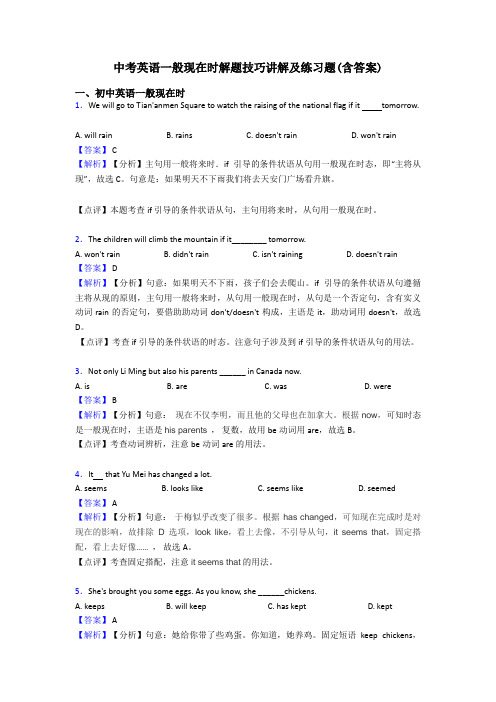
中考英语一般现在时解题技巧讲解及练习题(含答案)一、初中英语一般现在时1.We will go to Tian'anmen Square to watch the raising of the national flag if it tomorrow.A. will rainB. rainsC. doesn't rainD. won't rain【答案】 C【解析】【分析】主句用一般将来时.if引导的条件状语从句用一般现在时态,即“主将从现”,故选C。
句意是:如果明天不下雨我们将去天安门广场看升旗。
【点评】本题考查if 引导的条件状语从句,主句用将来时,从句用一般现在时。
2.The children will climb the mountain if it________ tomorrow.A. won't rainB. didn't rainC. isn't rainingD. doesn't rain【答案】 D【解析】【分析】句意:如果明天不下雨,孩子们会去爬山。
if 引导的条件状语从句遵循主将从现的原则,主句用一般将来时,从句用一般现在时,从句是一个否定句,含有实义动词rain的否定句,要借助助动词don't/doesn't构成,主语是it,助动词用doesn't,故选D。
【点评】考查if引导的条件状语的时态。
注意句子涉及到if引导的条件状语从句的用法。
3.Not only Li Ming but also his parents ______ in Canada now.A. isB. areC. wasD. were【答案】 B【解析】【分析】句意:现在不仅李明,而且他的父母也在加拿大。
根据now,可知时态是一般现在时,主语是his parents,复数,故用be动词用are,故选B。
【点评】考查动词辨析,注意be动词are的用法。
英语一般现在时全面讲解(附练习及答案)
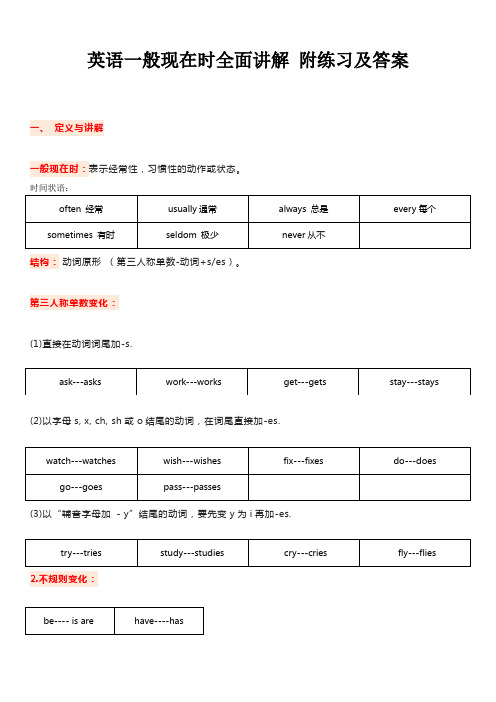
英语一般现在时全面讲解附练习及答案一、定义与讲解一般现在时:表示经常性,习惯性的动作或状态。
结构:动词原形(第三人称单数-动词+s/es)。
第三人称单数变化:(1)直接在动词词尾加-s.(2)以字母s, x, ch, sh或o结尾的动词,在词尾直接加-es.(3)以“辅音字母加- y”结尾的动词,要先变y为i再加-es.2.不规则变化:二、一般现在时用法1. 表示经常性,习惯性,永久性的动作或存在的状态.通常与副词sometimes, often, usually, always, every day (year, month ), once (twice, three times) a day,等时间状语连用。
2. 表示客观真理,科学原理,自然现象,等客观事实或格言,谚语等。
三、一般现在时的句子转换:(1)当句子中有be动词或情态动词时,则把be动词或情态动词(can,could等等)提到主语的前面变成疑问句;在be动词或情态动词后面加not变成否定句.(2)当句子中即没有be动词,也没有情态动词时,则在主语前加助动词do (you,以及复数), does(单数she,he,it)变成问句;在主语后谓语动词前加助动词don’t(I,you,以及复数), doesn’t(单数she,he,it)变成否定句,助动词后的动词要变成动词原形。
名师解析1.________ you often ________ tea?A.Do;drinks B.Does;drink C.Do;drink分析:你经常喝茶吗?根据often可知句子为一般现在时,主语为you,用助动词Do提问,动词用原形,C 符合题意,故选C。
2.My legs .A.hurt B.hurts C.hurting分析:我的腿……。
A痛,动词原形;B痛,动词单三形式,主语是名词复数,谓语动词用原形,排除;C痛,现在分词,用于现在进行时,构成be doing,缺少be,排除。
一般现在时讲解及练习
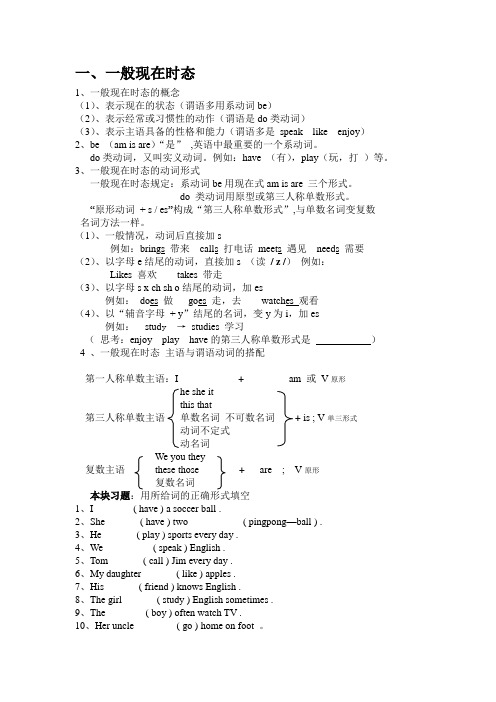
一、一般现在时态1、一般现在时态的概念(1)、表示现在的状态(谓语多用系动词be)(2)、表示经常或习惯性的动作(谓语是do类动词)(3)、表示主语具备的性格和能力(谓语多是speak like enjoy)2、be (am is are)“是”,英语中最重要的一个系动词。
do类动词,又叫实义动词。
例如:have (有),play(玩,打)等。
3、一般现在时态的动词形式一般现在时态规定:系动词be用现在式am is are 三个形式。
do 类动词用原型或第三人称单数形式。
“原形动词+ s / es”构成“第三人称单数形式”,与单数名词变复数名词方法一样。
(1)、一般情况,动词后直接加s例如:brings 带来calls 打电话meets 遇见needs 需要(2)、以字母e结尾的动词,直接加s (读/ z /)例如:Likes 喜欢takes 带走(3)、以字母s x ch sh o结尾的动词,加es例如:does 做goes 走,去watches 观看(4)、以“辅音字母+ y”结尾的名词,变y为i,加es例如:stud y →studies 学习(思考:enjoy play have的第三人称单数形式是)4 、一般现在时态主语与谓语动词的搭配第一人称单数主语:I +am 或V原形he she itthis that第三人称单数主语单数名词不可数名词+ is ; V单三形式动词不定式动名词We you they复数主语these those + are ; V原形复数名词本块习题:用所给词的正确形式填空1、I _______ ( have ) a soccer ball .2、She ______ ( have ) two __________ ( pingpong—ball ) .3、He ______ ( play ) sports every day .4、We ______ ( speak ) English .5、Tom ______ ( call ) Jim every day .6、My daughter ______ ( like ) apples .7、His ______ ( friend ) knows English .8、The girl ______ ( study ) English sometimes .9、The _______ ( boy ) often watch TV .10、Her uncle ______ ( go ) home on foot 。
小学英语一般现在时知识点全面讲解附练习及答案
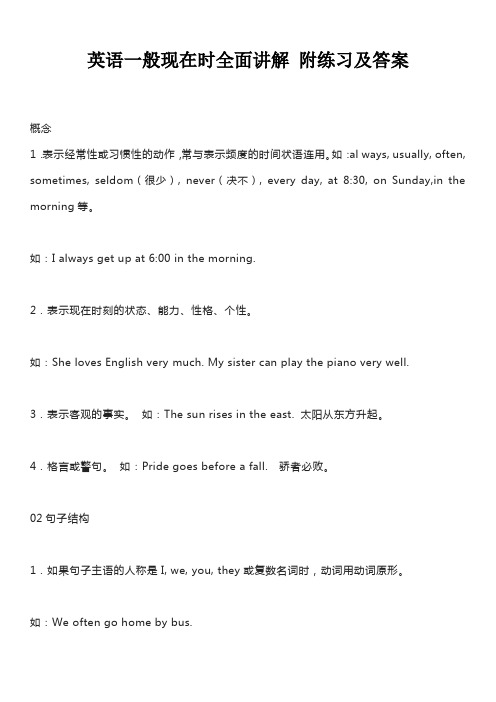
英语一般现在时全面讲解附练习及答案概念1.表示经常性或习惯性的动作,常与表示频度的时间状语连用。
如:al ways, usually, often, sometimes, seldom(很少), never(决不), every day, at 8:30, on Sunday,in the morning等。
如:I always get up at 6:00 in the morning.2.表示现在时刻的状态、能力、性格、个性。
如:She loves English very much. My sister can play the piano very well.3.表示客观的事实。
如:The sun rises in the east. 太阳从东方升起。
4.格言或警句。
如:Pride goes before a fall. 骄者必败。
02句子结构1.如果句子主语的人称是I, we, you, they或复数名词时,动词用动词原形。
如:We often go home by bus.2.如果句子的主语是第三人称单数,即:he, she, it 或单数名词时,动词要用第三人称的单数形式。
如:He often goes home by bus03动词的第三人称单数构成规则1.一般情况下在动词的后面直接加“s”;如:work→works play→plays¬ rain→rains see→sees visit→visits2.以o, x,s,sh, ch结尾的动词,在后面加“es”;如:do→does fix→fixes guess→guesses wash→washes teach→teaches3.以辅音字母加y结尾的动词,先把“y”改为“i”, 再加“es”;如:fly→flies study→studies carry→carries4.不规则变化。
如:have→has04注意在一般现在时的句子中,如果前面使用了助动词does, doesn’t, will, won’t, can, can’t, would, wouldn’t, must, mustn’t 等,尽管主语是第三人称单数,后面的动词用动词原形。
一般现在时态讲解与练习
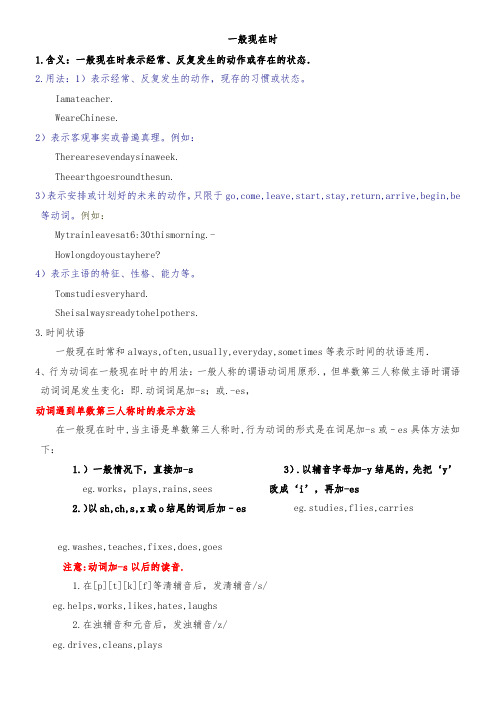
一般现在时1.含义:一般现在时表示经常、反复发生的动作或存在的状态.2.用法:1)表示经常、反复发生的动作,现存的习惯或状态。
Iamateacher.WeareChinese.2)表示客观事实或普遍真理。
例如:Therearesevendaysinaweek.Theearthgoesroundthesun.3)Array 43.4、下:eg.washes,teaches,fixes,does,goes注意:动词加-s以后的读音.1.在[p][t][k][f]等清辅音后,发清辅音/s/eg.helps,works,likes,hates,laughs2.在浊辅音和元音后,发浊辅音/z/eg.drives,cleans,plays3.在[s][z][∫][][]后,发/iz/rises,wishes,teaches,urges4.在[t][d]后,发/ts//dz/eg.fits,sets,needs5.其他情况下发[z]eg.plans,cries,shows5.否定形式:主语是第三人称单数,在行为动词前加doesn’t.行为动词变为原形。
其余人称作主语时,都在行为动词前加don’t6.1、时间状语:often经常,usually通常,always总是,every每个,sometimes有时,at…在几点钟只有第三人称单数用动词三单,其余动词均用原形三单变化:1)、多数在动词后加s?:play—plays?like—likes2)、以s,x,sh,ch,o结尾的动词加es :go—goes wash--washes3)、以辅音字母加y结尾,把y改i再加es :fly—flies练一练1.Weoften___________(play)intheplayground.2.He_________(get)upatsixo’clock.3.__________you_________(brush)yourteetheverymorning.4.What (do)heusually (do)afterschool?5.Danny (study)English,Chinese,math,ScienceandArtatschool.10.Mikehastwolettersforhim.一般疑问句,否定句:11.IusuallyplayfootballonFridayafternoon.否定句,一般疑问句:12.SuYangusuallywashessomeclothesonSaturday.否定句:一般疑问句:划线提问:13.SuYangusuallywashessomeclothesonSaturday.(划线提问)14.Mingmingusuallywaterstheflowerseveryday否定句:一般疑问句:划线提问15.Tomdoeshishomeworkathome.否定句:一般疑问句:划线提问:期服短ogontheface.Helikesitverymuch.Tickorcross()31.Peopletelltimebyaclockorbyawatch.()32.Weusuallyputaclockinthepocketoronthewrist.()33.Ontheroundfaceofaclocktherearesomehands.()34.Weusuallyputawatchonthewall.()35.Tomlikeshisclockverymuch.Fillintheblanks:36.Wecantellthetimeby_________________orbyaclock.37.The_________isbiggerthanawatch.38.Awatchhastwoorthree_________onits_________.39.Peopleoftenputtheclock____________________________.40.Tom’s________canspeakandcallhimto_________________everyday.一般现在时态练习题一、写出下列动词第三人称单数的变化形式;behavecomegostayteachwritetakestudywatchflyplay二、用括号中所给词的适当形式填空;1.Thebuses______(use)alotofoil.2.Eachofus______(have)strongpointsandweakpoints.3.Mydaughter___(watch)TVeveryday.Sometimesshe__(see)afilmonSunday.1.2.3.4.5.6.1.TheBrowns________anicecarandBrown'sbrother________anicejeep.A.have/haveB.has/hasC.have/hasD.has/have2.Iftheirhouse________notlikeours,what________itlooklike?A.is/isB.is/doesC.does/doesD.does/is3.-____youthinkhewillcome?-Ifit________tomorrow,hewillnotcome.A.Do/rainsB.Are/rainsC.Do/willrainD.Are/willrain4.Thelittlechild____notevenknowthatthemoon________aroundtheearth.A.do/moveB.do/movesC.does/movesD.did/moved5.Manyastudent___fondoffilms,butagoodstudentseldom__tothecinemaA.are/goesB.is/goesC.are/goD.is/一般现在时练习题用所给词的正确形式填空。
最新英语一般现在时解题技巧讲解及练习题(含答案)

最新英语一般现在时解题技巧讲解及练习题(含答案)一、初中英语一般现在时1.You will be healthier than before as long as you ______ less meat and more vegetables.A. are eatingB. eatC. will eatD. have eaten【答案】 B【解析】【分析】句意:只要你少吃肉多吃蔬菜,你就会比以前更健康。
as long as引导条件状语从句,时态是主将从现,故此处是一般现在时,故选B。
【点评】考查时态,注意as long as引导条件状语从句,时态是主将从现的用法。
2.Will you get wet if I ______ the experiment?A. will doB. doC. doesD. did【答案】 B【解析】【分析】句意:如果我做实验,你会淋湿吗?if引导的条件状语从句,时态是主将从现,从句主语是 I,故谓语是动词原形,故选B。
【点评】考查时态,注意f引导的条件状语从句,时态是主将从现的用法。
3.Not only Li Ming but also his parents ______ in Canada now.A. isB. areC. wasD. were【答案】 B【解析】【分析】句意:现在不仅李明,而且他的父母也在加拿大。
根据now,可知时态是一般现在时,主语是his parents,复数,故用be动词用are,故选B。
【点评】考查动词辨析,注意be动词are的用法。
4.I don't know if he tomorrow. If he , I'll call you at once.A. comes, comesB. will come; comesC. will come, will come【答案】 B【解析】【分析】句意:我不知道他明天是否回来。
一般现在时的讲解及习题
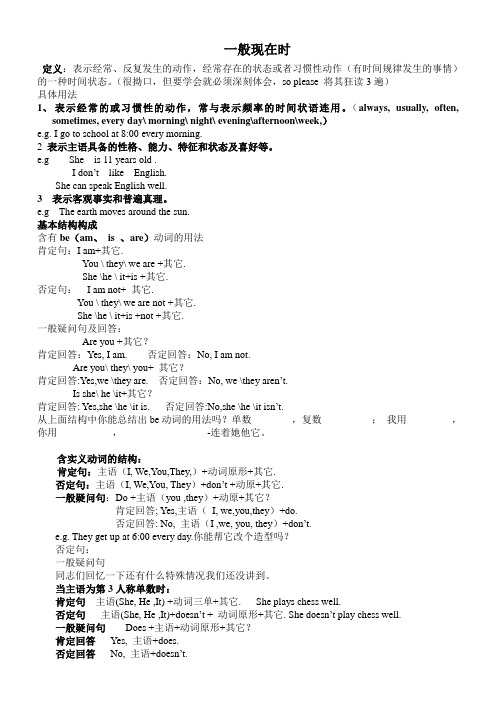
一般现在时定义:表示经常、反复发生的动作,经常存在的状态或者习惯性动作(有时间规律发生的事情)的一种时间状态。
(很拗口,但要学会就必须深刻体会,so please 将其狂读3遍)具体用法1、表示经常的或习惯性的动作,常与表示频率的时间状语连用。
(always, usually, often,sometimes, every day\ morning\ night\ evening\afternoon\week,)e.g. I go to school at 8:00 every morning.2 表示主语具备的性格、能力、特征和状态及喜好等。
e.g She is 11 years old .I don’t like English.She can speak English well.3表示客观事实和普遍真理。
e.g The earth moves around the sun.基本结构构成含有be(am、is 、are)动词的用法肯定句:I am+其它.You \ they\ we are +其它.She \he \ it+is +其它.否定句:I am not+ 其它.You \ they\ we are not +其它.She \he \ it+is +not +其它.一般疑问句及回答:Are you +其它?肯定回答:Yes, I am. 否定回答:No, I am not.Are you\ they\ you+ 其它?肯定回答:Yes,we \they are. 否定回答:No, we \they aren’t.Is she\ he \it+其它?肯定回答: Yes,she \he \it is. 否定回答:No,she \he \it isn’t.从上面结构中你能总结出be动词的用法吗?单数________,复数_________ ;我用_________,你用__________ ,______________-连着她他它。
- 1、下载文档前请自行甄别文档内容的完整性,平台不提供额外的编辑、内容补充、找答案等附加服务。
- 2、"仅部分预览"的文档,不可在线预览部分如存在完整性等问题,可反馈申请退款(可完整预览的文档不适用该条件!)。
- 3、如文档侵犯您的权益,请联系客服反馈,我们会尽快为您处理(人工客服工作时间:9:00-18:30)。
一般现在时的讲解以及练习题一、含义一般现在时表示经常发生的、习惯性的动作,或存在的状态.1、表示经常性或习惯性的动作。
I get up at six(6:30) every day.——我每天六点(6:30)起床。
He reads English every morning.——他每天早晨读英语。
2.表示现在的状态,或主语具备的性格、特征、能力等。
例:The sky is blue.——天空是蓝色的。
Tom studies very hard.——汤姆学习很努力。
She likes noodles.——她喜欢面条。
He’s twelve. ——他12岁。
They speak French.——他们说法语。
I am a teacher.——我是一名教师。
We are Chinese.——我们是中国人。
阳转。
The moon goes around the earth.月亮绕着地球转。
There are seven days in a week . 一周有七天.Two and four is six .二加四等于六。
如:My train leaves at 6:30 this morning.我乘坐的火车在今天早晨6:30离开。
How long do you stay here? 你在这住多久?begin [b ɪˈg ɪn]v 开始,再来一次start [st ɑ:rt]n& vi 开始;动身;起点come [k ʌm]v 来leave [li:v]n 辞别、假期, v 离开,出发arrive [əˈra ɪv]v 到达stay[ste ɪ]n& vi 停留,住下return [r ɪˈt ɜ:n]v.返回;送还;n.归来,返乡;二、一般现在时常用时间状语once[wʌns]adv.一次;一倍;曾经;conj.一旦…就…;n.一次,一回twice[twaɪs] adv.两次;两倍;两遍★ 4、频率副词★一般现在时常和never 、seldom、 rarely、barely、hardly、always, often, usually, sometimes等表示时间的状语连用1、never [ˈnevə(r)] adv.决不;从不,从来没有;【否定意义最强】2、seldom[ˈseldəm]adv.很少,偶尔,不经常【表示次数很少,=not offten,程度次于never】3、rarely[英][ˈreəli] adv.很少地,难得地,少见地 ,珍奇地【表示数量很少】barely[ˈbeəli]adv.仅仅,勉强,几乎不,几乎没有;赤裸裸地,公开地【强调勉强够数;】4、hardly[英][ˈhɑ:dli]简直不,几乎不,几乎没有【=almost not,强调困难.程度次于seldom】scarcely[英][ˈskeəsli][美][ˈskersli]adv.几乎不,简直不【scarely=hardly ,用在be/助动词后,强调数量和程度的不足】5、always [ˈɔ:lweɪz] adv.总是,永远,常常;【程度最强】6、usually adv.通常,经常,平常;一般;【程度稍次于always】7、often [ˈɔ:fn]多次,时常,【程度次于usualy】8、sometimes[ˈsʌmtaɪmz]有时,【程度次于often】三、一般现在时的用法※★(一)、肯定句★※★1、句中有系动词be的一般现在时构成★主语+be+其它The girl is my friend. 这个女姟是我的朋友。
※Be包括am,is,are。
句中有be这个动词时,如果主语是第一人称单数I时要be用am;主语是第三人称单数he,she,it时be要用is;主语是其他形式,即you,we,they时be要用are。
例:I am a student.我是一名学生。
We are students.我们是学生。
You are very beautiful.他们很美丽。
She is my best friend.她是我最好的朋友。
Kitty is an English girl.基蒂是一名英国女孩。
The bag is mine. 这个书包是我的。
Lucy and lily are good friend.露西和丽丽是好朋友。
★2、句中有情态动词的一般现在时★构成:主语+情态动词+动词原形+其它She can speak English.她会说英语。
He can do his homework by himself.他自己能做家务。
★3、句中是行为动词的一般现在时★(1)构成:主语+行为动词+其他These boys like playing football.这些男孩子喜欢玩足球。
The girl reads English every morning.这个女孩子每天早晨读英语。
※注意:当主语为第三人称单数时,行为动词要加s或者esfly- flies, carry-carries study-studies为[iz] ,①She(He, It )likes fish.她(他,它)喜欢鱼。
(主语为第三人称单数)②The table has four legs.桌子有四条腿。
(主语为单数可数名词)③They go to school every day .他们每天都去上学。
(主语是复数可数名词的,动词用原形)※(3)动词加 -s 以后的读音※1.在[p] [t] [k] [f] 等清辅音后,发清辅音 /s/;但在[t] 后,发/ts/。
eg.fits, sets, needs。
helps , works, likes, hates ,laughs2.在浊辅音和元音后,发浊辅音/z/;在[d]后发 /dz/。
eg.drives, cleans, plays3.在[s] [z] [∫ ] [] []后,发/iz/。
eg.rises, wishes, teaches, urges※(4)为第三人称单数的词※★1、人称代词he, she, it是第三人称单数。
如:He likes watching TV. 他喜欢看电视。
She has lunch at twelve. 她十二点吃午餐。
It looks like a cat. 它看起来像只猫。
★2、单个人名、地名或称呼作主语;是第三人称单数。
如:①Han Mei looks like her mother. 梅看起来像她的母亲。
②Beijing is in China. 在中国。
③Uncle Wang often makes cakes. 王叔叔经常做蛋糕。
天听收音机。
★3、单数可数名词或"this / that / the+单数可数名词"作主语时,是第三人称单数。
如:★4、不可数名词作主语时为第三人称单数。
如:②The bread is very small. 那面包很小。
★5、不定代词someone, somebody, nobody,somethin , everything g等及指示代词this, that作主语时,是第三人称单数。
如:①Everyone is here. 大家到齐了。
②There is something wrong with the watch. 这块手表有毛病。
③This is a pen. 这是一支钢笔。
④That is an eraser. 那是一块橡皮擦。
★6、当数字或字母作主语时,看作第三人称单数。
如:①"6" is a lucky number. "6"是个吉利数字。
②"I" is a letter. "I"是个字母。
例句:She____(take) Eddie for a walk after supper.【takes】He_____(wa sh) clothes with his hands.【washes】Look at the animal, it ____(have) four legs.【has】My father____(listen) to the radio every day.【listens】我的爸爸每天听收音机。
Mike____(stu dy) in a middle school.【studies】Simon ____(pa ss) the ball to Daniel.【passes】Miss Li____(tea ch) Chinese.【teaches】(二)、※★否定句★※★1、句中有be动词(am , is , are )时,一般现在时的1、I ’m not /am not (not) from Taizhou.He can not fly . 他不能飞。
She can not speak English.他不会说英语。
You must not open the door.你不必开门。
They should not be right.他们不应该是对的。
I will not go to Japan.我将不会去日本了。
can[kæn]能,能够,may[meɪ]可以,must [mʌst] 必须 s hould [ʃʊd] 应该;将会;可能;★(3)句中没有be动词或情态动词时,主语为第三人称do + not (don’t)。
构成:主语+do/does +not + 行为动词原形+ 其他☆主语是第一人称/第二人称的单数或复数的,以及主语是第三人称复数的例句:→They like apples. (oranges)they donot like oranges.他们喜欢苹果,不喜欢桔子。
→We take a bus to school every day.(walk to school)We don’t walk to school every day.我们每天乘公交上学,不是步行上学。
☆主语是第三人称的单数的例句→It looks like a cat. It doesn’t look like a hat.它看上去象一只猫,不象是一顶帽子。
→His brother plays football after school. (play basketball)His brother doesn’t play basketball.他的哥哥在放学后玩足球,不玩篮球。
→She has a dog at home. (a cat)She doesn’t have a cat at home.她家里有一个狗,没有猫。
→Jordan _____(play) basketball.[plays]He _________(not play) football.[doesnot play]乔丹打篮球不打足球。
